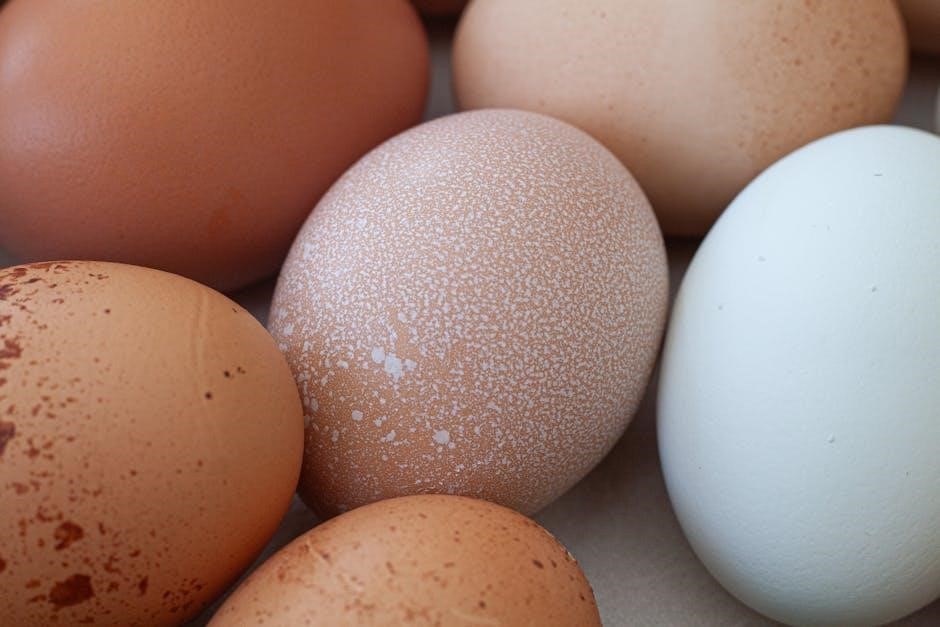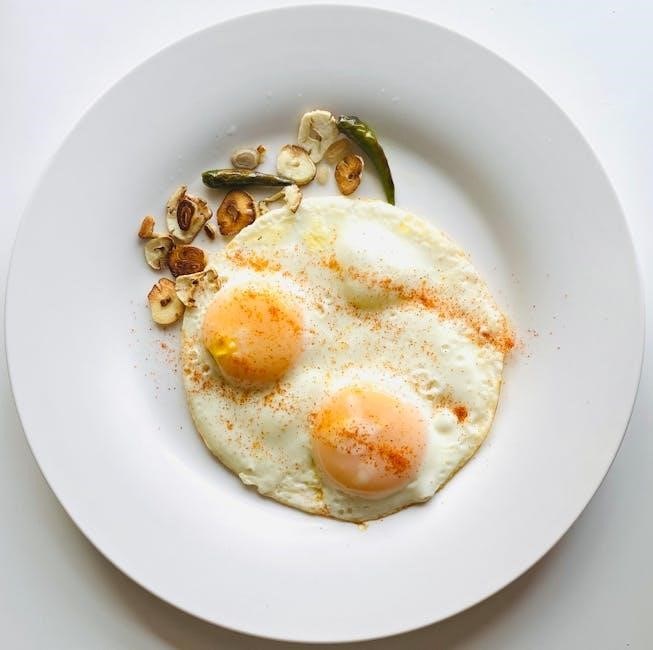A low cholesterol diet focuses on reducing saturated fats and increasing fiber intake to promote heart health. It emphasizes whole foods like fruits‚ vegetables‚ and whole grains‚ helping lower LDL levels naturally. By incorporating healthy fats and lean proteins‚ this diet supports overall well-being and reduces the risk of heart disease. A well-structured low cholesterol meal plan can be both nutritious and flavorful‚ making it a sustainable choice for long-term health.

Why Cholesterol Matters for Heart Health

Cholesterol plays a crucial role in heart health by affecting blood flow and artery function. High levels of LDL (“bad” cholesterol) can lead to plaque buildup in arteries‚ increasing the risk of heart disease and strokes. Managing cholesterol through diet helps maintain healthy blood vessels and prevents cardiovascular conditions. A low cholesterol diet focuses on reducing saturated fats and increasing fiber intake‚ which supports balancing LDL and HDL (“good” cholesterol) levels. By understanding the impact of cholesterol‚ individuals can make informed dietary choices to protect their heart health and overall well-being.
Overview of the Low Cholesterol Food List
A low cholesterol food list emphasizes nutrient-dense options that help lower LDL levels and improve heart health. It includes a variety of fruits‚ vegetables‚ whole grains‚ lean proteins‚ and healthy fats. Foods rich in fiber‚ such as oats‚ barley‚ and leafy greens‚ are highlighted for their cholesterol-lowering benefits. The list also prioritizes plant-based proteins like legumes and tofu‚ along with heart-healthy fats from avocados and nuts. By focusing on these foods‚ individuals can create balanced meals that support long-term cholesterol management and overall well-being. This approach ensures a diet that is both effective and sustainable.

Best Food Choices to Lower Cholesterol
Focus on whole‚ nutrient-rich foods like fruits‚ vegetables‚ and whole grains to lower cholesterol naturally. Incorporate lean proteins‚ healthy fats‚ and fiber-rich options for a balanced diet.
Fruits: Citrus Fruits‚ Berries‚ and Apples
Citrus fruits like oranges and grapefruits are rich in vitamin C and flavonoids‚ which support heart health. Berries‚ such as blueberries and strawberries‚ are packed with antioxidants that help reduce inflammation and improve cholesterol levels. Apples contain pectin‚ a soluble fiber that binds to cholesterol in the digestive tract‚ preventing its absorption. Incorporating these fruits into your diet can significantly contribute to lowering LDL cholesterol while providing essential nutrients and natural sweetness to meals. They are versatile and can be enjoyed as snacks‚ added to salads‚ or blended into smoothies for a healthy boost.
Vegetables: Leafy Greens‚ Cruciferous Vegetables‚ and Carrots
Leafy greens such as spinach and kale are rich in fiber and antioxidants‚ which help lower cholesterol. Cruciferous vegetables like broccoli and Brussels sprouts contain compounds that support detoxification and improve heart health. Carrots are high in soluble fiber‚ which binds to bile acids‚ reducing LDL cholesterol. These vegetables are versatile and can be incorporated into salads‚ stir-fries‚ or soups. Regular consumption supports overall cardiovascular well-being and contributes to a balanced low-cholesterol diet. Their nutrient density makes them a cornerstone of heart-healthy eating‚ offering numerous benefits beyond cholesterol reduction.
Protein Sources for a Heart-Healthy Diet
Opt for lean proteins like skinless chicken‚ turkey‚ and fish‚ as well as plant-based options such as legumes‚ tofu‚ and edamame. These choices support heart health by reducing cholesterol levels and promoting overall well-being.
Lean Meats: Skinless Chicken‚ Turkey‚ and Fish
Lean meats like skinless chicken‚ turkey‚ and fish are excellent protein sources for a heart-healthy diet. They are low in saturated fats and cholesterol‚ making them ideal for reducing LDL levels. Opt for baking‚ grilling‚ or steaming to avoid adding extra fat. Fish‚ particularly fatty fish like salmon and tuna‚ are rich in omega-3 fatty acids‚ which further support heart health. Limit red meat consumption and choose lean cuts when possible. Pair these proteins with vegetables for balanced‚ nutritious meals that align with a low cholesterol lifestyle.
Plant-Based Proteins: Legumes‚ Tofu‚ and Edamame
Plant-based proteins like legumes‚ tofu‚ and edamame are excellent low-cholesterol alternatives to meat. Legumes‚ such as lentils‚ chickpeas‚ and black beans‚ are rich in fiber‚ which helps lower LDL cholesterol. Tofu and edamame‚ derived from soybeans‚ are low in saturated fats and high in nutrients. These options are versatile‚ fitting easily into soups‚ salads‚ and stir-fries. They provide essential amino acids and are naturally cholesterol-free‚ making them ideal for heart-healthy diets. Incorporating these plant-based proteins supports overall well-being and helps maintain balanced cholesterol levels without sacrificing flavor or nutritional value.

Whole Grains and Fiber-Rich Foods
Whole grains and fiber-rich foods are essential for a low cholesterol diet. They are rich in nutrients‚ vitamins‚ and minerals‚ helping to lower LDL cholesterol and improve heart health.
Oats‚ Quinoa‚ Brown Rice‚ and Whole Grain Bread
Oats‚ quinoa‚ brown rice‚ and whole grain bread are excellent choices for a low cholesterol diet. Oats are rich in soluble fiber‚ which helps absorb LDL cholesterol. Quinoa is a complete protein and fiber-rich‚ supporting heart health. Brown rice provides sustained energy and fiber‚ while whole grain bread offers more nutrients than refined options. These foods are versatile and can be incorporated into meals like breakfast porridges‚ salads‚ side dishes‚ or sandwiches. They not only lower cholesterol but also improve digestion and overall well-being‚ making them a cornerstone of a heart-healthy diet.
Barley‚ Bulgur‚ and Whole Grain Pasta
Barley‚ bulgur‚ and whole grain pasta are nutrient-rich‚ high-fiber options that support a low cholesterol diet. Barley is packed with soluble fiber‚ which binds to LDL cholesterol‚ aiding its removal. Bulgur‚ made from whole wheat‚ offers sustained energy and fiber. Whole grain pasta provides more nutrients and fiber compared to refined alternatives. These foods are versatile and can be used in salads‚ soups‚ or as side dishes. Incorporating them into meals helps lower cholesterol‚ improve digestion‚ and maintain a balanced diet‚ making them excellent choices for heart health and overall well-being.

Healthy Fats and Dairy Options
Incorporate avocados‚ nuts‚ and olive oil for healthy fats‚ and opt for low-fat dairy or plant-based alternatives to support heart health and reduce LDL cholesterol levels naturally.
Avocados‚ Nuts‚ and Olive Oil
Avocados are rich in monounsaturated fats‚ which help lower LDL cholesterol while raising HDL levels. Nuts‚ such as almonds and walnuts‚ provide healthy fats and fiber‚ supporting heart health. Olive oil‚ a key Mediterranean diet component‚ is high in monounsaturated fats that reduce inflammation and improve cholesterol profiles. These foods are excellent substitutes for saturated fats‚ promoting a balanced diet. Incorporating them into meals enhances flavor and nutrition‚ aiding in long-term cholesterol management and overall cardiovascular well-being.
Low-Fat Dairy and Plant-Based Alternatives
Low-fat dairy products‚ such as skim milk‚ yogurt‚ and cheese‚ offer essential nutrients without excessive saturated fats. Plant-based alternatives like almond‚ soy‚ and oat milk are cholesterol-free and rich in vitamins. These options support heart health by reducing cholesterol intake while providing calcium and protein. Incorporating them into meals helps maintain a balanced diet without compromising on nutrition. They are versatile and can be used in various recipes‚ making them ideal substitutes for high-fat dairy in a low-cholesterol lifestyle.
A low-cholesterol diet rich in whole grains‚ lean proteins‚ and healthy fats can significantly improve heart health. Plan balanced meals using the food list to stay consistent and track progress effectively.
How to Incorporate These Foods into Your Daily Meals
Plan meals around whole grains like oats‚ quinoa‚ and brown rice‚ and pair them with vegetables. Add lean proteins such as skinless chicken or tofu to your dishes. Incorporate healthy fats like avocados and olive oil for flavor and nutrition. Aim to include a variety of colorful fruits and leafy greens in salads or snacks. Use the low cholesterol food list as a guide to make informed choices. Meal prepping can help maintain consistency‚ while experimenting with recipes keeps meals exciting. Balancing portion sizes ensures you stay on track without feeling deprived.

Benefits of a Low Cholesterol Diet for Long-Term Health
A low cholesterol diet offers numerous long-term health benefits‚ primarily reducing the risk of heart disease and stroke by lowering LDL levels. It helps stabilize blood vessel function‚ improving circulation and overall cardiovascular health. By focusing on nutrient-rich foods‚ this diet supports weight management and enhances energy levels. Additionally‚ it reduces inflammation‚ which is linked to chronic diseases like diabetes. Over time‚ adhering to this diet can improve lipid profiles‚ lowering the need for medications. It also promotes better gut health through high fiber intake‚ further preventing conditions like high blood pressure and digestive disorders‚ ensuring a healthier‚ more balanced lifestyle.